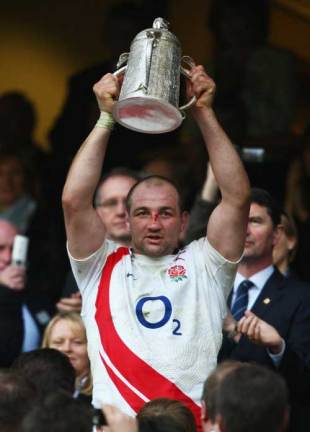|
England 26-12 Scotland, Six Nations Championship, March 21
Time for a changing of the guard
Huw Baines
March 21, 2009

Steve Borthwick lifts the Calcutta Cup, in a fixture that may have more prominence next season
© Getty Images
Enlarge
In recent seasons the Calcutta Cup has become a stand-alone contest. With both England and Scotland languishing in Six Nations mediocrity the game became a singular highlight, shorn of its meaning in terms of the Championship race. While this season's showpiece at Twickenham followed the same format, it could yet be the precursor to change. Scotland's defeat could be the end of coach Frank Hadden's tenure, the thoughtful Scot potentially paying the price for a second consecutive championship with only a single win. England meanwhile have finished the tournament on a high. Their crushing win over France and a workmanlike but professional showing this afternoon will have built confidence in a squad that will now have to push on. Both England's players and fans will have to be patient and settle in to being a developing side; this isn't 2003 and it won't be for some time again unless the chance is now taken to introduce the younger players in the squad. Julian White, Phil Vickery, Simon Shaw, Steve Borthwick and Joe Worsley will all need to be replaced in the coming years and that process has to start in earnest now despite their contributions this season. This Six Nations will not be remembered as a great one for England regardless of their second place finish in the table, much as last season's wasn't, but at least in their final two performances they have procured building blocks. Tom Croft, James Haskell, Nick Kennedy, Delon Armitage and Ugo Monye have all enjoyed runs in the side and should do so for time to come. There is a young, exciting spine to the England team that is waiting to be released and Martin Johnson's future success is now contingent in them becoming the real deal; not the promising youngsters shielded from confrontation. If England are to be great again then there can't be many more Mathew Taits being let down by the management. Scotland's problems appear to be slightly more deep-rooted. Without England's tremendous player pool they are left, in a similar way to Nick Mallett's Italy, with several excellent players and plenty of holes elsewhere. Again at Twickenham this afternoon their genuine moments of quality came from the usual suspects, skipper and scrum-half Mike Blair and wing Thom Evans, who both produced pacy breaks in the opening period. The problem for the Scots, put simply, is their lack of cohesion in the backs. They are well drilled and aggressive in defence, as most international sides now are, but they have no cutting edge despite several dangerous runners. The sight of Simon Danielli in open field with no support will be a barb for the Scotland management and fans alike, and the sight of yet another scoresheet punctuated only by penalty goals on their side will be another unwelcome keepsake from this year's Six Nations. Hadden's reign was lit up by their campaign in 2006, with wins over France and England creating a feelgood factor that has been noticeably missing from the fans and players in recent years. There was optimism all around at the start of the tournament, but from the non-selection of the Evans brothers for their opening loss to Wales up until this point, there has been scant regard for their hopes both in Scotland and abroad. Should Hadden leave his post in April, his successor will find a difficult task ahead. The oldest fixture in world rugby might soon get a new lick of paint, and it might just be enough to restore it to a deservingly prominent place in the sporting calendar. © Scrum.com
|
Live Sports
Communication error please reload the page.
-
Football
-
Cricket
-
Rugby
-
- Days
- Hrs
- Mins
- Secs
F1 - Abu Dhabi GP
Abu Dhabi Grand Prix December 11-131. Max Verstappen ()
2. Valtteri Bottas (Mercedes)
3. Lewis Hamilton (Mercedes)
4. Alexander Albon ()
5. Lando Norris ()
6. Carlos Sainz Jr ()
-
ESPNOtherLive >>
Boxing - Nelson v Wilson; Simmons v Dickinson; Joshua v Gavern (Metro Radio Arena, Newcastle)
Golf - Houston Open
Snooker - China Open
Tennis - Miami Open

